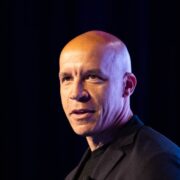The Lavin Agency Speakers Bureau
A speakers bureau that represents the best original thinkers,
writers, and doers for speaking engagements.
We value your privacy
We use cookies to enhance your browsing experience and to analyze our traffic. By clicking "Accept All", you consent to our use of cookies.
We use cookies to help you navigate efficiently and perform certain functions. You will find detailed information about all cookies under each consent category below.
The cookies that are categorized as "Necessary" are stored on your browser as they are essential for enabling the basic functionalities of the site. ...
Necessary cookies are required to enable the basic features of this site, such as providing secure log-in or adjusting your consent preferences. These cookies do not store any personally identifiable data.
Functional cookies help perform certain functionalities like sharing the content of the website on social media platforms, collecting feedback, and other third-party features.
Analytical cookies are used to understand how visitors interact with the website. These cookies help provide information on metrics such as the number of visitors, bounce rate, traffic source, etc.
Performance cookies are used to understand and analyze the key performance indexes of the website which helps in delivering a better user experience for the visitors.
Advertisement cookies are used to provide visitors with customized advertisements based on the pages you visited previously and to analyze the effectiveness of the ad campaigns.
A speakers bureau that represents the best original thinkers,
writers, and doers for speaking engagements.
The goal of being alive is to figure out what it means to be alive.
Pop culture, in all its distracting glitz, isn’t just entertainment. It is culture—American culture. And our most insightful guide is Chuck Klosterman. In his bestselling, culture-defining books, he’s pinned down modern America like no one else. And in fun, funny talks, he not only cuts to the bone of our media-saturated moment, but makes it the site of our shared, unlikely commonality.
“Writing about pop culture doesn’t get any better than this, or any funnier.”Stephen King on Fargo Rock City
“One of the most insightful critics of pop-culture writing today” (Publishers Weekly), Chuck Klosterman is not a detached academic who deconstructs culture at arm’s-length. He’s a regular guy whose curiosity is insatiable, infectious, and hilarious—showing why “pop” is a conversation that anyone can join in on, and capturing what it feels like to navigate our weird, wired, pop-obsessed moment right now. He is the New York Times bestselling author of eight nonfiction books (most notably Sex, Drugs and Cocoa Puffs and I Wear the Black Hat) and two novels (Downtown Owl and The Visible Man). Downtown Owl was recently adapted into a film.
His most recent work, The Nineties, is a “superb reassessment of an underappreciated decade from a stupendously gifted essayist” (Booklist). In it, Chuck explores the massive cultural shifts of the ’90s, using the past to give us a glimpse into our future. It’s “a fascinating trip down memory lane” (TIME) from “Generation X’s definitive chronicler of culture” (GQ).
His earlier works include Raised in Captivity, a collection of surreal short stories so true they had to be wrapped in fiction for our own protection. The Washington Post calls it an “engagingly sardonic collection that will leave you, like one of Klosterman’s own bewildered characters, ‘relaxed and confused.’” Another recent collection, Chuck Klosterman X, compiles and contextualizes the best of his essays from the past decade, with pieces written on everything from Taylor Swift, Jonathan Franzen, and Charlie Brown, to Mountain Dew and steroids.
His previous book—debuting in its first week on The New York Times bestsellers list—is But What If We’re Wrong?: Thinking About the Present As If It Were the Past. It’s both an earnest attempt to speculate on what, and how, our culture might transform over time, and a rational inoculation against the dangers of assumption. It dispels the “casual certitude” of our era by imagining what culture might look like 100, 300, or even 1,000 years from now.
One of the brightest pieces of pop analysis to appear this century.The Onion on Sex, Drugs, and Cocoa Puffs
Chuck has written for The Washington Post, The New York Times, SPIN, Esquire, GQ, The Guardian, The Believer, Billboard, The AV Club, and ESPN. He served as The Ethicist for The New York Times Magazine for three years, where he dispensed uncommon wisdom on moral conundrums, and appeared as himself in the LCD Soundsystem documentary Shut Up and Play the Hits. He also created the web site Grantland with Bill Simmons.
Pulitzer Prize-Winning author of Stay True New Yorker staff writer CBS Sunday Morning contributor

Founder of Street Symphony Co-Founder of the Skid Row Arts Alliance MacArthur Genius

Social Historian, Cultural Critic & Community Organizer Author of We Gon’ Be Alright and Can't Stop Won't Stop

Founder of the "I Matter" Poetry and Art Competition Teen Vogue 21 Under 21 Honoree Winner of the Princeton Prize in Race Relations

Award-Winning Artist Advocate for the Legacy of Nina Simone

World-Renowned Artist Winner of the US Department of State Medal of Arts Guggenheim Fellow

Author of Grit, the #1 New York Times Bestseller | Pioneering Researcher on Grit, Perseverance, and the Science of Success

2024 Nobel Prize Winner | 3rd Most Cited Economist in the World | MIT Institute Professor | Bestselling Co-Author of Why Nations Fail and Power and Progress

Pulitzer Prize-Winning Creator of The 1619 Project | Executive Producer of the Emmy Award-Winning 1619 Project Hulu Docuseries | MacArthur Genius

Nike's Former Chief Marketing Officer | Author of Emotion by Design
CEO of The Atlantic | Former Editor-in-Chief of WIRED

In this keynote, based on his new book But What If We’re Wrong?, Chuck Klosterman visualizes the contemporary world as it will appear to those who’ll perceive it as the distant past. Throughout, he asks questions that are profound in their simplicity: How certain are we about our understanding of gravity, or time? What will be the defining memory of rock music, 500 years from today? Ho...
